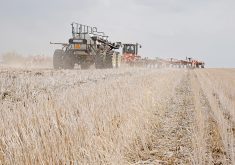Not quite ready for retirement but looking to take your foot off the gas a bit?
There are a few strategies for transitioning away from an active farming role while still using your land assets to generate revenue. These strategies include land rentals and joint ventures.
Below are tax considerations to keep in mind when renting out farmland or considering a joint venture.
Personally owned farmland
Cash rental income from farmland will be taxed at your personal tax level.
Read Also

New AgriInvest requirements can have major implications
AgriInvest is an effective initiative that has positively helped farmers mitigate unexpected risks, allow for better cash flow and access additional funds to invest in capital improvements.
Cash rents can put you at risk for falling offside with the family farm rollover rules, meaning you would be forced to pay tax on the fair value of the land in your estate, as if you had disposed of it, rather than being able to roll it over, tax free, to your children.
To avoid falling offside, a general rule of thumb is to ensure that you don’t cash rent the land for longer than you actively farmed it.
Before considering cash rents on your farmland, speak to a tax professional to ensure you stay onside and avoid paying more in taxes.
Corporately owned farmland
Cash rents in a corporation would be considered passive income, assuming it is not being paid by a related party. Because land rental is not the principal business activity of a farm, it means the income from cash rents could be taxed at a rate as high as 50.7 percent in the prairie provinces. You will, however, get 30.7 percent of this refunded upon the payment of dividends out of the corporation and to yourself.
Similarly, the general rule of thumb for staying onside with the family farm rollover rules remains the same as cash rents on personally owned farmland.
An additional tax related consideration would be that cash renting farmland would affect the small business deduction limit. In recent years rules have been implemented that result in a reduction to your small business deduction for any net cash rent (or passive income) received over $50,000 in your associated corporate group.
Joint venture
Joint ventures can be as simple as you contribute the land and another farmer or rancher contributes the equipment and labour.
If you are considering scaling down your operations and know of others who are looking for an advantageous way to expand their operations, a joint venture may be a good option for you.
Joint ventures are not partnerships. They involve two separate entities agreeing to work together for a set time. Income received from the joint venture is combined with the normal income of each respective member of the joint venture, allowing for each member to use their own small business deduction. Joint ventures allow for expanded operations by teaming up with your fellow farmers and ranchers while maintaining ownership of your assets.
When the time comes to disband the joint venture, there is no need to engage in lengthy and costly dissolutions. Simply, each member of the joint venture walks away with the assets they contributed and there are no tax consequences for ending a joint venture, except to the extent that you have cash basis adjustments from the previous year that may still have to be dealt with.
There are a wide range of options available to you when looking to take your foot off the gas and begin to coast into the next stages of your life. Be sure to consult with your tax advisers to help you find the fit that best works for you and your future.
Colin Miller is a chartered accountant and partner with KPMG’s tax practice in Lethbridge. Contact: colinmiller@kpmg.ca.















